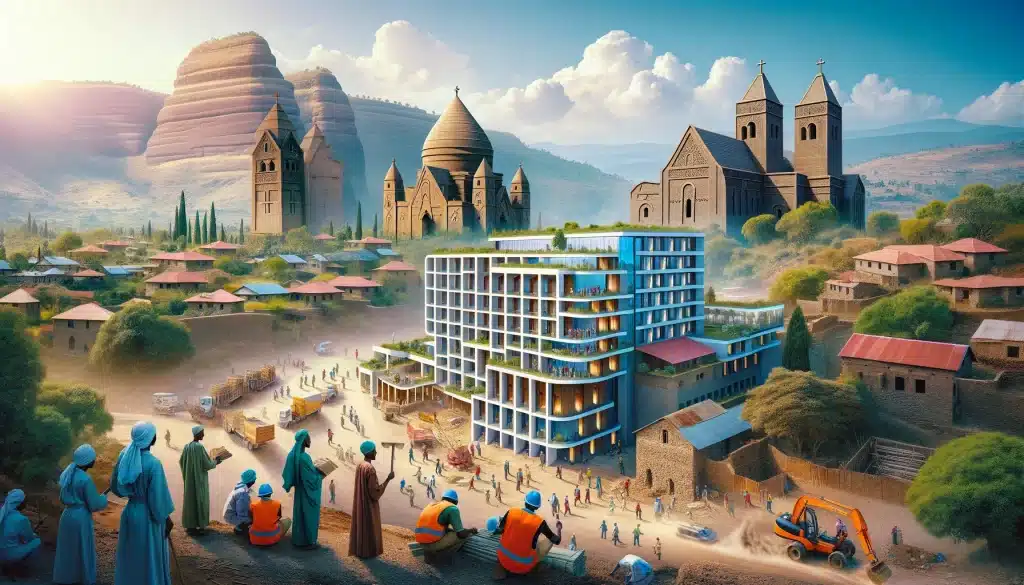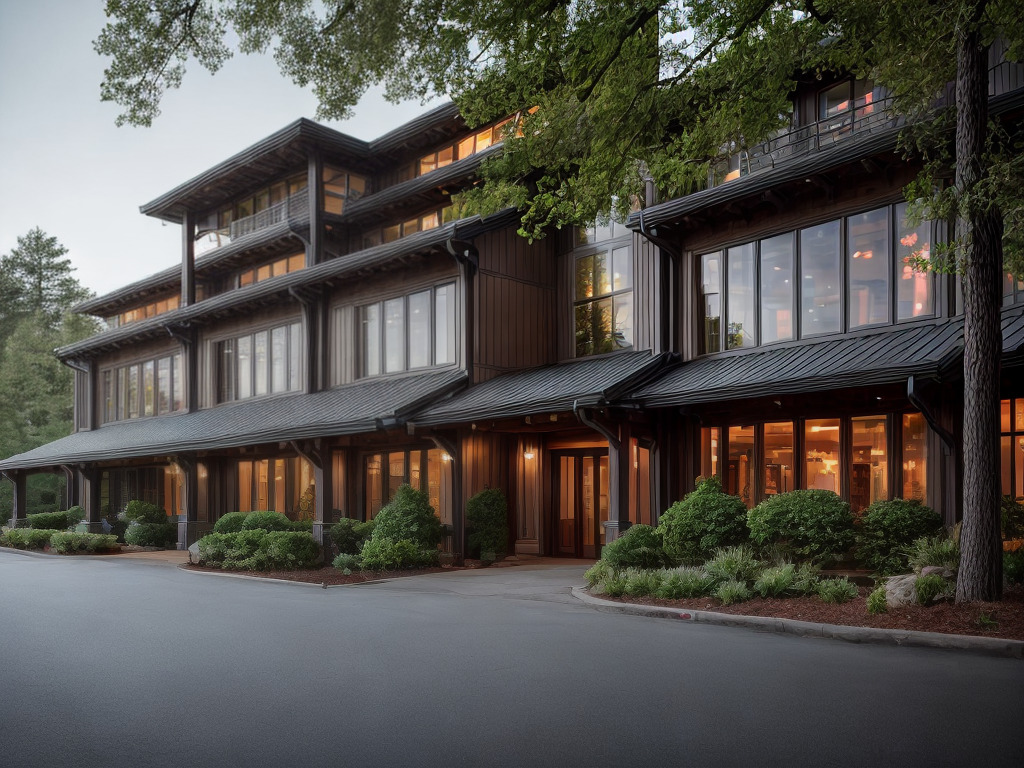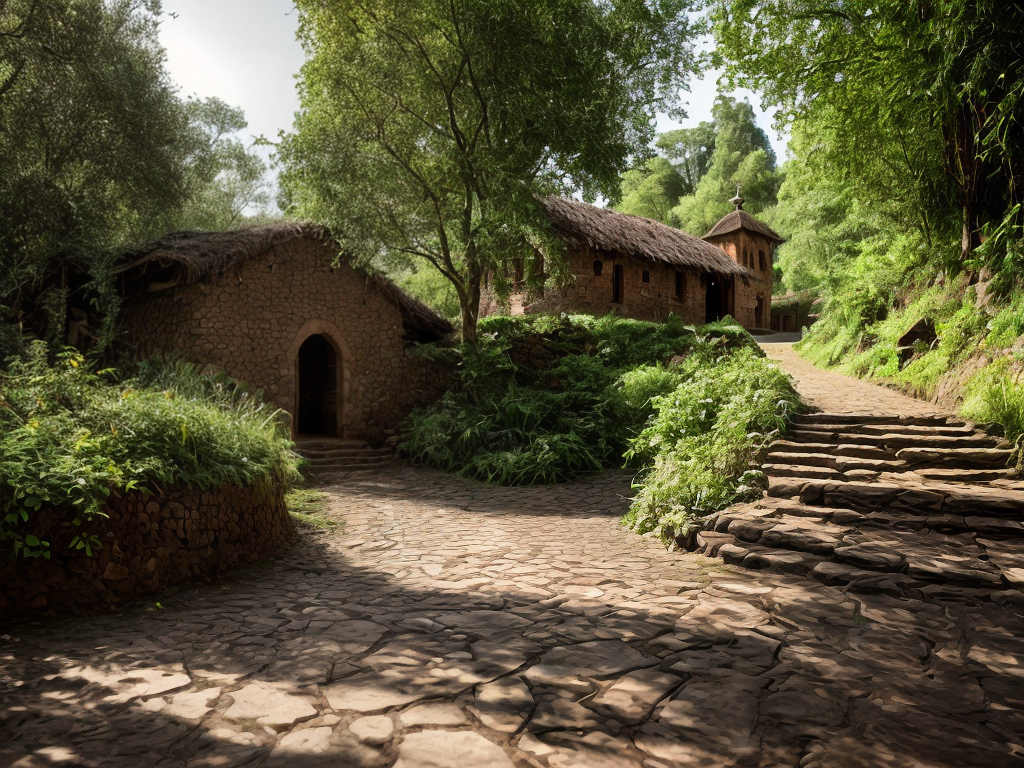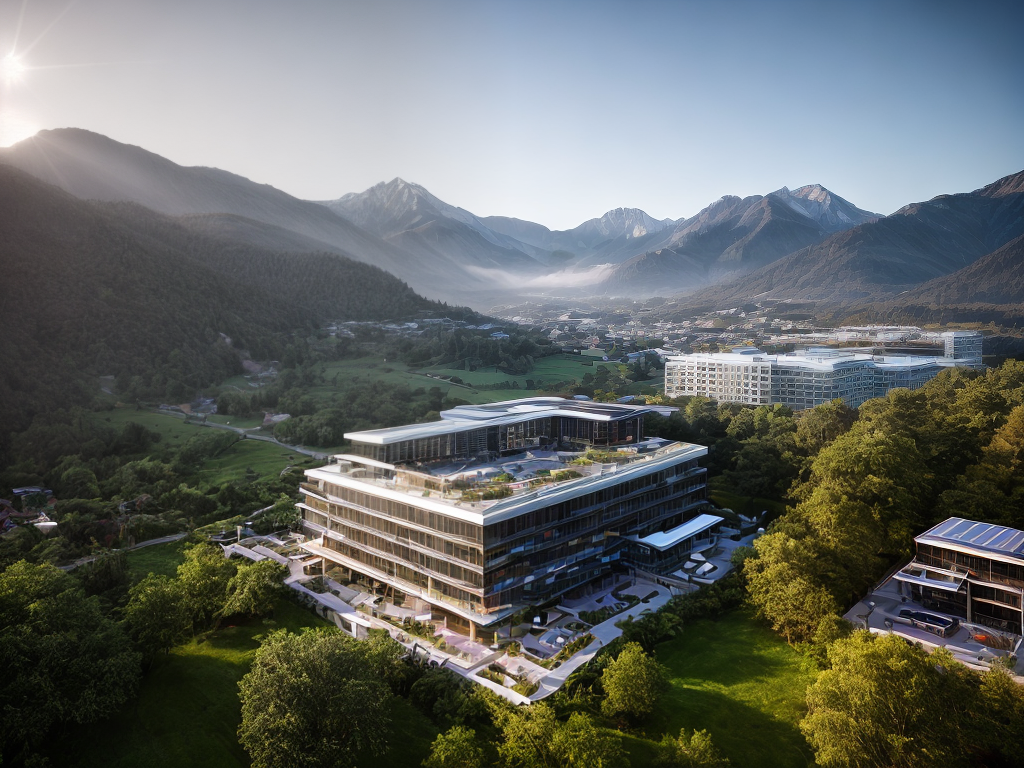Dreaming Big: Lalibela, A Site of Inspiration
The historic town of Lalibela stands as one of Ethiopia’s crowning glories. Nestled amidst the Lasta Mountains at over 2,500 meters of elevation, Lalibela is a place where dreams and wonders merge. As the former capital of the Zagwe dynasty and home to 11 rock-hewn churches dating back to the 12th and 13th centuries, Lalibela holds an exalted place in Ethiopia’s history and culture.
The majestic churches of Lalibela, carved directly into pink volcanic rock, are a testament to artistic vision and architectural genius. These magnificent buildings have rightfully earned Lalibela a designation as a UNESCO World Heritage Site. Beyond the churches themselves, Lalibela retains a rich traditional ambiance with its stone houses, winding alleyways, and bustling markets.
For many visitors, Lalibela feels like stepping straight into ancient times while also being very much alive in the present day. Prayer processions and church rituals unfold in the same spaces where they have been conducted for nearly a millennium. This sense of being transported makes Lalibela one of the most magical and inspiring places in the world.
Given its abundance of historic and natural wonders, Lalibela sees ever-increasing numbers of tourists each year. Visitors feel compelled to walk in the footsteps of King Lalibela and those who crafted such astonishing churches. Yet Lalibela’s tourist infrastructure remains underdeveloped, especially in terms of lodging. With more tourists and religious pilgrims hoping to experience majestic Lalibela, the demand for hotels has substantially increased.
Lalibela is thus now faced with an opportunity to expand accommodations and tourism facilities to welcome greater numbers of guests, all while retaining the town’s distinctive character. By constructing thoughtfully-designed hotels and utilizing flexible equipment rentals, the dreams of Lalibelans and visitors alike can be built upon Lalibela’s legacy.
The Allure of Lalibela: Ethiopia’s Historic Religious Center
For Ethiopians, Lalibela holds profound religious significance. King Lalibela sought to create a “New Jerusalem” in Africa after the original Jerusalem fell to Islamic conquest. The churches of Lalibela thus came to symbolize a new holy city for Ethiopian Orthodox Christians, who make up over 40% of the nation’s population today.
Many devout pilgrims consider a trip to Lalibela’s churches as a once-in-a-lifetime experience. For them, walking through tunnels and passageways carved into the rocky churches lets them connect physically and spiritually with their faith’s history. Beyond the churches, they find further inspiration in Lalibela’s traditional way of life centered around Christianity.
Alongside Ethiopian pilgrims, international tourists from an array of countries and backgrounds visit Lalibela each year. They come to be astonished by the incredible rock-hewn architecture and learn about the town’s pivotal role in Ethiopian history. Witnessing the deep devotion of worshippers in the churches gives tourists a profound insight into living Ethiopian traditions.
Above all, many visitors are simply overwhelmed by the sensual experience of being in Lalibela. They are awestruck by the majestic churches and enjoy immersing themselves in bustling local markets with richly colored spices and woven fabrics. Lalibela provides an entirely different way of living and perceiving the world that profoundly moves those who experience it.
As an exceptionally holy place, Lalibela has much to offer both religious pilgrims and secular tourists. From orchestrated church ceremonies to everyday moments in the community, visitors can tap into the town’s ancient roots and continuing spiritual significance.
More and more people are feeling the pull to make a journey to this extraordinary place as word of Lalibela’s wonders spreads.
Constructing with Care in Lalibela’s Historic Landscape
The demand for visitor accommodation has risen sharply given Lalibela’s ballooning popularity. Yet therein lies a challenge – how can new lodging be constructed that serves visitor needs but also seamlessly blends into the traditional Lalibela setting?
Past uncontrolled development in Lalibela has already degraded parts of the historic landscape. Early lodges were built haphazardly without oversight, often clashing with the aesthetics of the surroundings. UNESCO authorities have justifiable concerns about this continuing.
However, working collaboratively with heritage authorities, hotel developers in Lalibela can formulate construction plans that are sensitive to protecting the town’s distinctive character. With careful spatial planning, high-quality architectural designs, and sustainable practices, new hotels can organically integrate into the area.
Constructing lodging facilities requires a nuanced understanding of Lalibela’s complex urban environment. Builders must consider proximity to the churches, transportation access, impacts on the community, preservation of green space, and how large-scale construction fully alters neighborhoods.
By truly listening to locals and planning comprehensively, hotels can be designed that respect the rhythms of Lalibela life. Constructing lodging in harmony with Lalibela’s essence takes open communication, patience, and setting modest development goals. When done right, new hotels can preserve what is so special about Lalibela for both residents and visitors.
Bringing New Lodging to Life in Lalibela
For much of its history, Lalibela has remained a small, close-knit community with limited tourism infrastructure. Only a dozen basic hotels with fewer than 800 total rooms serve the growing influx of visitors today. Most facilities lack the amenities that international tourists expect.
Demand now far exceeds availability, especially during Lalibela’s peak visitation times. Reports abound of visitors wandering the town searching fruitlessly for vacant hotel rooms. With such limited lodging, Lalibela is missing opportunities to deliver a world-class tourist experience and benefit from tourism dollars.
To unlock Lalibela’s economic potential, the current hotel shortage must be addressed. New lodging built to international standards will allow Lalibela to host greater tourist numbers and earn increased tourism revenue. Expanding quality accommodations also lets tourists stay longer to have a fuller experience of Lalibela’s cultural and natural offerings.
Done thoughtfully, increasing Lalibela’s hotel capacity can be a win-win proposition. With strict development regulations, new lodging can add value for tourists while improving the livelihoods of Lalibelans. Additional hotel construction mandates a smart approach but holds tremendous promise for Lalibela’s future.
Designing Hotels that Complement Lalibela’s Rich History
Some may argue that Lalibela has enough hotels given its small size and heritage status, fearing new lodging could disrupt traditional life. However, when designed appropriately, new hotels can seamlessly blend into the surroundings to benefit both visitors and locals.
The architectural style and scale of hotels profoundly impact how well they complement Lalibela’s historic aesthetic. New lodging should draw design inspiration from Lalibela’s heyday during the 12th and 13th centuries. Features like arched windows, interior courtyards, carved motifs, and stone façades allow hotels to harmonize with the character of the churches.
At the same time, NEW hotels must meet contemporary needs. Finding the right balance of historic design principles combined with modern conveniences is key. Larger hotel developments can be broken into separate buildings with green spaces in between to reduce the apparent size from any given viewpoint.
Through collaborative planning with heritage authorities, hotels can be thoughtfully designed and oriented to avoid disturbing sight lines to the churches and key landmarks. With care and creativity, new lodging can feel seamless amidst the extraordinary setting of Lalibela.
Hotel Construction in Lalibela: Blending Old and New
Hotels aren’t the only structures being developed in Lalibela. As tourism expands, so does demand for restaurants, cafes, shops, cultural centers, parks, and transportation links. Lalibela thus requires an overarching development masterplan to guide balanced growth.
With strategic development planning, Lalibela can construct new buildings that provide modern amenities without diminishing the traditional urban fabric. Some principles for blending old and new include:
- Using authentic designs inspired by Lalibela’s historic architecture
- Selecting local construction materials like stone, wood and plaster
- Limiting building heights to avoid overshadowing iconic churches
- Adding green spaces between developments to maintain openness
- Connecting walkways and trails to link sites while preserving natural areas
- Burying utility lines underground to avoid visible clutter
- Incorporating Lalibela motifs and styles into hotel furnishings and decoration
Blending centuries-old designs with present-day demands requires renewed creativity. Yet Lalibela can construct lodging and infrastructure that simultaneously celebrates the past and facilitates the future.
Building New Hotel Dreams Amidst Lalibela’s Ancient Wonders
Some skeptics worry that any new hotel construction will irrevocably damage Lalibela’s timeless aura. However, with rigorous regulations and planning, building expanded lodging can actually celebrate Lalibela’s enduring magnetism.
New hotels in Lalibela have the opportunity to be living monuments to the town’s history and culture. Their design can draw direct inspiration from the rock-hewn churches, echoing architectural details like arches, pillars, insets and carvings. Traditional weaving, painting and furniture can adorn hotel interiors to surround guests with Lalibela’s creative spirit.
Beyond design, new lodging can give tourists immersive experiences focused on Lalibela’s enduring traditions. Hotels can host spiritual heritage tours, folk music and dance performances, craft demonstrations, and lectures by local scholars. Integrating cultural knowledge into hotels makes them dynamic spaces to discover Lalibela’s essence.
When conceived holistically from the ground up, new hotels in Lalibela need not be sterile amenities divorced from the surroundings. Instead, they can profoundly celebrate what makes Lalibela so extraordinary in the first place – its astonishing historical relics, lively cultural endurance, and spiritual aura.
Respecting the Past While Building Lalibela’s Tourism Future
Some contend Lalibela has endured enough change and all construction should halt to preserve what remains. However, a moratorium on development would only worsen Lalibela’s economic stagnation and infrastructure problems. With careful planning, new lodging and amenities can be major assets.
The trick is to define where, how much and what kind of new buildings make sense. Construction that encroaches on Lalibela’s core historic areas would clearly be unacceptable. Yet there are open spaces on the town’s periphery that could accommodate sensitively-designed hotels, particularly smaller lodges and guest houses.
With strict zoning policies, new construction can be concentrated in lower-impact zones to keep Lalibela’s heart intact. The scale and density of hotels must be regulated so open space remains around developments. Designs should blend with Lalibela’s look and feel rather than imposing foreign concepts.
Change is inevitable in any living community. The goal in Lalibela is managing change to enhance livability and economic prospects while protecting heritage. With foresight and wise policies, hotel expansion and infrastructure upgrades can make Lalibela an even better place to live and visit.
Crafting Hotel Plans That Honor Lalibela’s Legacy
Some fault past hotel developments in Lalibela for prioritizing profits over preservation. Yethotel projects can be catalysts for good if created with Lalibela’s legacy in mind. Every new hotel design should start by asking – how can this contribute to Lalibela’s future?
To honor Lalibela, hotels can be designed to harmonize with the surroundings through fitting architectural styles and materials. Location choices should avoid historic and natural areas. Hotels can give back to Lalibela by training staff in hospitality skills and sourcing food, furniture and art locally.
Shared infrastructure like roads, water systems and sewage planned around new hotels should be sized to benefit the whole community. Hotels can dedicate space for community programs, small business incubators and social service offices to foster local development.
Most importantly, new lodging should instill a sense of pride in Lalibelans. Hotels celebrating Lalibela’s design traditions and showcasing local culture proudly proclaim: Lalibela has much to offer the world. With community members involved in shaping plans, hotels can become enduring monuments to Lalibela’s living heritage.
New Lodging to Invite More Visitors to Historic Lalibela
As a UNESCO World Heritage Site, Lalibela has enormous tourism potential. Yet growth has been constrained by limited accommodation. On peak dates, visitors swarm Lalibela’s handful of small hotels which charge exorbitant rates due to lack of competition.
Constructing larger, higher-end hotels would encourage more tourists to come and extend their stays. Lalibela’s peak visitor totals only number in the thousands annually – major heritage tourism destinations see millions. More flights now connect to Lalibela’s airport, creating opportunity for enormous tourism growth.
Spurring a surge in visitors has risks, as seen in heavily-touristed heritage sites like Machu Picchu where overcrowding damages the experience. Careful planning is required to build adequate lodging for sustainable increases in visitors to Lalibela.
New hotels with added capacity and amenities can make Lalibela accessible to more middle-class travelers. Currently, only wealthier tourists can afford Lalibela’s limited expensive options. More lodging diversity and competition can bring prices down, enabling Lalibela to be discovered by greater numbers.
Expanding Options for Visitors to Experience Lalibela’s Treasures
Lalibela contains not just historical wonders but also captivating natural landscapes. Mountains, forests, and dramatic escarpments surround the town. However, few hotels help tourists enjoy outdoor adventures amidst Lalibela’s rugged rural charm.
New boutique nature lodges on Lalibela’s periphery could support wildlife viewing, hiking, mountain biking and rock climbing excursions. Farmstay accommodations could connect visitors directly to rural life through village tours and homestays. Campgrounds are needed to accommodate younger budget travelers.
Beyond the standard hotel package, creative lodging options utilizing tents, lodges and eco-cabins could support a wider range of experiences. Lalibela has boundless potential for community tourism, adventure tourism, agro-tourism and other niches beyond religious pilgrimage.
Thoughtfully expanding lodging diversity lets tourists immerse themselves in Lalibela’s full range of cultural, historical and natural wonders. With varied accommodations and tour activities, Lalibela becomes more than just churches – it becomes a gateway to exploring Ethiopia’s incredible human and geographical landscapes.
Sensitively Integrating Modern Hotels into a Historic Setting
Some worry new hotels with ultra-modern styles could ruin Lalibela’s traditional ambiance. Yet contemporary design can blend harmoniously when executed with care. The key is using modern elements subtly to supplement Lalibela’s signature historic character.
New lodging can adopt contemporary environmental features like solar panels, energy-efficient appliances, and sustainable water systems without visibly changing exteriors. Interiors can have modern luxuries like spas and fitness centers. Stylish new restaurants and bars give hotel guests and locals exciting culinary options.
With strategic design choices and positioning, modern hotels can be integrated sensitively. For instance, more daringly styled hotels can be located in Lalibela’s new outer neighborhoods rather than right beside ancient churches. Scale and height restrictions prevent overly massive structures.
Through careful planning, hotels in Lalibela can achieve that elusive alchemy of feeling simultaneously modern yet timeless. Contemporary comforts give guests what they expect while exteriors and layouts honor Lalibela’s extraordinary legacy. This blending of old and new enhances the town’s dynamism.
Enhancing Access to Lalibela’s Churches with New Hotels
One benefit of new hotels is that they can improve tourist circulation to better manage crowds visiting Lalibela’s churches. Currently, most hotels are clustered around just a couple of churches. Tourists get funneled to overcrowded sites while others remain quiet.
Strategically placed new lodging can redistribute tourist traffic and prevent bottlenecks. Hotels near Lalibela’s outskirts can feature shuttle transportation to bring tourists directly to lesser-visited churches during peak times. With hotels situated throughout the town, tourists experience more of Lalibela than just its most famous sites.

Careful planning is crucial so hotels don’t clog streets or interfere with religious processions. But designed holistically, distributed hotels can actually protect Lalibela’s churches by reducing congestion pressures. Managing tourist flows through lodging location choices is a positive for both visitors and locals.
New hotels crafted intelligently in consultation with heritage authorities can prevent damage to religious sites from overuse. Lalibela’s churches need this intervention to accommodate tourism growth sustainably.
Making Hotel Construction in Lalibela Sustainable and Eco-Friendly
Some contend new hotels inevitably bring environmental disruption – construction noise, habitat loss, and pollution from added traffic. However, applying green building practices can minimize hotels’ ecological impact. Lalibela’s development guidelines now mandate that all new buildings incorporate sustainable features.
Designing for sustainability starts with the hotel’s placement. Building on previously undeveloped open land should be avoided. New hotels can instead utilize vacant lots within developed areas or replace outdated existing structures. This repurposing of already impacted spaces prevents additional habitat destruction.
During construction, eco-friendly practices include recycling building materials, minimizing waste, and preventing soil runoff. Once open, hotels should meet stringent energy and water efficiency benchmarks through features like low-flow fixtures, solar water heating, and LED lighting. Wastewater must be treated and reused for irrigation when possible.
By making environmental sustainability central to all new hotels, Lalibela can maintain its natural splendor while enhancing economic opportunities. The town’s enduring charms arise directly from its natural setting – preserving this with green hotels is vital.
Green Designs for New Hotels to Preserve Lalibela’s Environment
Beyond standardized sustainability measures, green hotel design in Lalibela can actively enhance the surrounding environment. Nature-positive architecture and landscaping create spaces where people and wildlife can coexist peacefully.
Some ideas for designing eco-friendly hotels in Lalibela include:
- Green roofs/walls to reduce stormwater runoff and support bird habitats
- Native landscaping that provides food and shelter for wildlife
- Permeable pavements that allow groundwater recharge
- Low-level lighting is directed downward to avoid disrupting nocturnal animals
- Noise buffers and barriers to contain construction and hotel safety
- Minimal reflective surfaces or glass to prevent bird collisions
- Facilities for electric vehicles and shuttle transport to reduce emissions
- Advanced septic systems to avoid pollution from hotel wastewater
- Community composting to reduce hotel food waste
- Rainwater harvesting systems to conserve water
- Natural ventilation and cooling to minimize air conditioning needs
- Sourcing local sustainable materials like traditional stone and wood
Careful eco-friendly design enables new hotels to have net positive impacts on Lalibela’s environment. With green hotels and eco-lodges, tourism and conservation work hand in hand. The hotels become stewards supporting Lalibela’s natural heritage.
Constructing Hotels to International Standards in Lalibela
Thus far, hotels in Lalibela have offered basic accommodation but consistently fallen short of expectations for service, amenities and infrastructure. With Lalibela’s growing fame, new hotels must be built to international standards.
International-quality hotels require well-designed facilities. guest rooms should have sufficient space, modern bathrooms, quality mattresses, and amenities like WiFi, TVs, safes, and mini-fridges. Excellent heating, cooling, and soundproofing are essential.
Beyond the room, hotels need appealing public areas like lobby lounges, restaurants, pools, and rooftop terraces. Luxury hotels may feature conference facilities, business centers, spas, and fitness rooms. Staff must provide top-notch 24/7 service.
Meeting rigorous quality benchmarks for infrastructure and operations brings Lalibela’s hotels on par with top-tier tourist destinations elsewhere. With world-class lodging, Lalibela becomes so much more than ruins – it becomes a cosmopolitan getaway welcoming high-end travelers.
Bringing World-Class Amenities to Lalibela with New Hotels
Thus far, Lalibela’s limited dining options have failed to impress visitors. The same hotel restaurants serve identical menus of uninspired international fare. Exciting multicultural cuisine using Lalibela’s outstanding local products is glaringly absent.
New hotels bring opportunities to make Lalibela a culinary destination through creative restaurants and bars. These can showcase Ethiopia’s diverse food traditions, use local superfoods like teff, and even offer cooking classes for guests. Cafes can display handicrafts while serving rich Ethiopian coffee.
Beyond dining, larger hotels plan to offer amenities like outdoor heated pools, tennis courts, yoga studios, and movie theaters. A resort hotel could feature horseback riding, mountain biking, and guided hikes. These world-class amenities encourage visitors to stay longer and spend more in Lalibela.
LUXURY hotel chains like Kempinski and Marriott International have announced imminent openings in Lalibela, promising to bring new levels of service and sophistication. This marks the exciting start of a more diverse, vibrant hospitality scene.
Lalibela Hotel Construction: Blending Local Tradition with Global Connections
A legitimate concern is that new luxury hotels operated by international chains could import a contrived, generic experience lacking local flavor. However, leading global hoteliers understand the need for cultural immersion highlighted in modern luxury travel trends.
The most esteemed international hotel brands artfully blend local heritage and global connections in their properties’ designs, cuisines, amenities, arts, staffing and services. They strive to give guests comfort while surrounding them with authentic expressions of the destination.
Lalibela’s culture is certain to figure prominently in new hotels aiming for 5-star status. Luxury lodging will likely include:
- Traditional designs etched into hotel architecture, like carved motifs and stonework
- Handicrafts from local artisans, such as weavings and pottery, adorn public spaces
- Lalibela-inspired spa treatments using indigenous herbs, spices and oils
- Concierge services like guided tours of the historic churches
- Galleries displaying fine artwork from Ethiopian artists
- Restaurants fusing Ethiopian cuisine with international flair
The influx of top international hotels thus becomes an opportunity to show the world the richness of Lalibela’s cultural traditions. Blending local heritage and global connections creates an even more dynamic tourist experience.
Transcending Time: Modern Comfort in a Historic Place
For some, the influx of modern hotels seems at odds with Lalibela’s time-honored ambiance. Yet comfort has always been part of the Lalibela experience – in the 12th century, King Lalibela built luxurious lodging alongside the churches for pilgrims.
What matters is not whether the lodging is modern but how it connects guests to the destination. The finest hotels feel transcendent because their designs resonate with the place, their amenities showcase local culture, and their staff share insider knowledge.
While delighting guests with sublime comforts, Lalibela’s new hotels can be bridges to the past. Hearing call to prayer while lounging in an infinity pool, watching priests pass beneath a luxury suite’s balcony, sipping honey wine beside a centuries-old fig tree – these juxtapositions make heritage immersed in modernity so poignant.
Luxury amplifies Lalibela’s essence – that is the experience guests seek. The town’s hotels can blend both old world charm and new world comforts to joyfully transport travelers through time. In Lalibela, modernity gives us new ways to reconnect with the past.
New Hotel Construction Bringing More Jobs and Prosperity to Lalibela
Beyond improving tourism, new hotel construction directly benefits Lalibelans needing economic opportunities. Hospitality offers stable careers and pathways to skill development, especially for Lalibela’s many young residents seeking livelihoods.
International hotel chains arriving in Lalibela are committing to training and hiring locals for most positions. Contractors building hotels are sourcing construction crews from Lalibela’s underemployed workforce and using local sub-contractors for tasks like stonemasonry.
New hotels also create many indirect jobs – guides to lead sightseeing tours, drivers to provide airport transfers, and farmers and craftspeople to supply kitchens and gift shops. The tourism multiplier effect generates jobs across countless sectors.
With livelihood options expanded by new lodging, Lalibela’s standard of living stands to improve substantially. Hotel construction brings more than just economic activity – it brings hope for better lives anchored in Lalibela’s enduring assets.
Hotel Projects Fueling Economic Growth in Lalibela
Beyond direct employment gains, new hotel construction will have profound impacts on Lalibela’s local economy. Suppliers of construction materials from wood to lighting fixtures to plumbing will see sales surge. Property values are already rising in anticipation of tourism expansion.
With more foreign visitors staying longer, tourism dollars will multiply. Restaurants, shops, museums, tour operators and makers of handicrafts all benefit from increased tourist spending and extended hotel stays.
Lalibela’s municipal budget will grow larger from added tax revenues, enabling upgrades to infrastructure and public services. Beautification projects like street lighting, sidewalks, recreation facilities and waste management systems become feasible.
The long-term prospects look bright, as long as added visitor numbers are managed carefully to avoid excessive crowds. With strategic development, hotels can take Lalibela’s living heritage to soaring new levels of prosperity.
Training Local Workers for Hotel Construction Jobs
To ensure new hotels uplift Lalibelans, workforce training is essential. Globally, the construction and hospitality industries face labor shortages as demand outpaces qualified workers. Lalibela has ample willing workers who lack relevant technical skills.
Hotel developers are working alongside local authorities to establish training programs that prepare Lalibelans for careers in construction and hospitality. For construction, training focuses on specialized skills like masonry, electrical systems, and plumbing.
Hospitality training covers guest services, housekeeping, property maintenance, food safety, kitchen skills and more. Trainees also strengthen workplace competencies like computer usage, customer service, language abilities and professional etiquette.
With training assistance, Lalibelans can transform local hotel projects into launchpads for acquiring careers that empower individuals and strengthen communities. A new generation is gaining skills to chart Lalibela’s future.
Investing in Lalibelans Through Hotel Industry Training
Workforce development does not end once hotel construction is complete. Ongoing training elevates skills and gives employees advancement opportunities within hotels. Continued learning is woven into the culture of these enterprises.
Many hotels aim to fill over 90% of positions with Ethiopians, often locals from Lalibela. However, retention depends on offering desirable career paths. Hotels thus provide training programs to develop promising talent at all levels.
Front desk agents can build leadership competencies to become supervisors. Housekeepers gain skills to advance as stewards or public area attendants. Chefs master new cuisines and rise to head kitchen roles.
With accelerated training, motivated individuals can climb quickly from entry level roles into hotel management. Investing in Lalibela’s people to unlock their talents will be a moral and competitive imperative for new hotels.
Hotel Construction as a Catalyst for Community Development
Beyond creating jobs, new hotels being built in Lalibela have embraced a mission of improving lives throughout the community. Their investments aim to strengthen Lalibela as a place where local people actively participate in planning the area’s future.
Many hotels are funding new schools, clinics, community centers and microfinance programs for local entrepreneurs. New lodging facilities incorporate space to provide childcare, adult education, and social services alongside hotel operations.
Partnerships with community organizations amplify hotels’ development impact. Arranging volunteer activities empowers tourists to share skills with Lalibela’s residents. Purchasing goods through social enterprises directly supports vulnerable groups like at-risk youth and women.
Thoughtful hotel developers understand that uplifting local communities fosters goodwill and cements their hospitality businesses as assets for Lalibela. Their lasting contributions will be enriching Lalibela’s social fabric.
Equipment Rentals: The Flexible Solution for Hotel Projects
Constructing new hotels in a historic place like Lalibela poses many unique challenges. The natural terrain, variable underlying geology, nearby sensitive sites, lack of infrastructure, and outdated existing buildings require highly adaptable construction processes.
A flexible, cost-effective solution to tackle these complex hotel projects is utilizing equipment rentals versus purchasing outright. Renting specialized gear as needed allows hotel builders to respond nimbly to Lalibela’s distinct building conditions.
Key advantages of equipment rentals include:
- Paying only for the time equipment is used
- Adjusting readily to evolving project needs
- Accessing specialized tools for specific applications
- Avoiding storage and maintenance responsibilities
For Lalibela’s hotel developers, renting construction equipment is the most agile, smart approach to assembling the right machinery for getting these landmark projects built responsibly.
Renting Construction Equipment Saves Time and Money
Hotel developers in Lalibela using equipment rentals estimate they reduce project costs by 10-20% compared to purchasing outright. The savings arise from paying only for the equipment time truly needed, avoiding depreciation of unused machinery, and preventing storage and maintenance expenses.
Renting also saves time through the fast delivery of equipment tailored to each construction phase. The ability to rapidly scale machinery up or down prevents work delays compared to slowly acquiring owned equipment. Lalibela’s remote location makes long equipment lead times even more likely.
With rented equipment, developers avoid tying up capital purchasing assets. Their cash can be deployed more flexibly to get hotels up and running faster. The liquidity helps them better manage risks associated with Lalibela’s challenging construction conditions.
For cost and schedule savings vital to success, renting equipment is hotel builders’ logical choice in Lalibela’s constrained environment. The flexibility and savings empower them to achieve their accelerated development timetables.
The Benefits of Rented Equipment for Hotel Builds
Equipment rentals provide hotel developers in Lalibela with an array of advantages that enhance construction efficiency:
- Access specialty machinery like earthmovers, generators and lifts unavailable for purchase locally
- Prevent overbuying by matching machinery to current needs
- Easy to upgrade equipment as project scope evolves
- No repair costs – rentals handle all maintenance
- Reduce risks of owning equipment improperly sized for the actual work
Rentals also offer perks like training operators, providing expert technicians, and substituting equipment that breaks down. This operational support keeps hotel projects humming.
The many benefits of renting enable hotel builders to adapt to Lalibela’s unique construction conditions. For smooth execution with reduced costs and hassles, rented equipment is their ally.
Equipment Rentals Keep Projects On Time and Within Budget
Hotel developers must grapple with Lalibela’s complex construction environment. The remote location and surrounding heritage sites leave no room for delays or mistakes. Equipment rentals give control and precision to keep their projects on track.
Having immediate equipment access from rentals prevents work stoppages from waiting weeks for owned equipment to be delivered. Breakdowns don’t derail progress when replacements are supplied rapidly. Custom renting equipment to match needs optimizes efficiency.
The flexibility of rentals empowers builders to adapt to surprises and keep projects on budget. As plans change, equipment can be scaled effortlessly without overspending. Rentals hedge against risks like hidden site conditions that could delay permanent equipment purchases.
For new hotels to meet Lalibela’s growing lodging demand quickly and responsibly, equipment rentals are indispensable. Their nimble support drives projects seamlessly from concept to completion.
Access High-Quality Equipment Without Purchase Costs
Constructing hotels in Lalibela requires specialty foundation equipment, heavy cranes, generators and more that are unavailable for purchase locally. Importing machinery is expensive due to taxes, shipping costs and long lead times. High purchase prices also squeeze hotel construction budgets.
Renting premium equipment solves these problems by providing access without ownership. Builders can deploy top brands like Caterpillar and Komatsu through rentals here. No money is wasted purchasing equipment with limited long-term utility in Lalibela.
Short rental periods align costs closely to equipment needs for each phase. The selective use prevents assets from sitting idle between jobs.
For access to world-class equipment that fits their unique needs, hotel builders choose rentals for value and performance.
Adapting to Evolving Needs with Rented Equipment
Constructing modern hotels amidst Lalibela’s ancient landscape holds many uncertainties. Developers must adapt their equipment continually as challenges emerge. Rock formations under buildings, rain eroding excavations, and hidden tunnels all may arise.
Rented equipment provides maximum agility to tackle surprises. Rentals can be scaled up, swapped, or terminated nimbly as situations warrant without sunk costs. Having equipment needs met week-to-week by rentals is far more flexible than relying on fixed owned machinery.
Lalibela’s sites demand creative solutions. Equipment rentals enable builders to deploy innovative problem-solving machinery like compact earthmovers, small cranes specialized for tight spaces, or utility vehicles for precarious plots. Meeting changing equipment needs through short-term rentals enables builders to adapt quickly and keep projects on budget. For smooth-sailing construction in Lalibela’s tricky setting, rentals deliver optimal flexibility.
Avoiding Storage and Maintenance with Rentals
An underappreciated benefit of equipment rentals for hotel builders is that rental companies handle all the storage, transport and maintenance. For developers, machinery magically appears on site as needed without operational hassles.
With rentals, precious budget isn’t squandered building equipment yards or leasing storage space in land-constrained Lalibela. Transporting cumbersome machinery around Lalibela’s tight urban environment and rugged rural terrain also becomes the rental firm’s responsibility.
Once equipment arrives on site, rental companies provide any needed maintenance and repairs. Hotel builders avoid employing specialized technicians or procuring parts inventories. The turnkey support keeps machines in peak operating form.
Offloading these equipment burdens enables hotel developers to focus fully on constructing properties efficiently. Equipment rentals translate directly into time and cost savings.
Testing New Equipment Through Rentals
Lalibela’s unique construction environment demands creative applications of machinery. Developers are eager to pilot innovative technologies and models that could accelerate projects and prevent risks.
Renting equipment provides a low-risk avenue to field test new machines or methods before making purchase commitments. Builders can determine if equipment performs to expectations for Lalibela’s distinct sites without long-term financial risk.
Certain specialty gear like compact earthmovers, mini excavators, and toddler lift cranes promise advantages for Lalibela’s tight spaces. Renting these allows for assessing utility before purchasing the niche equipment outright.
Embracing leading-edge equipment through rentals enables hotel builders to enhance productivity on complex sites. Lalibela’s projects become living labs for pioneering technologies that may eventually transform hotel construction globally.
Equipment Rental: Scaling Gear to Project Size
Hotel projects in Lalibela range from small lodges or campgrounds embedded in nature to 100-room full-service hotels for international travelers. The spectrum of project scales makes buying equipment outright wasteful and impractical. No single machinery fleet suits all needs.
The flexibility of rentals allows developers to tailor equipment precisely to individual project requirements. A few small excavators may suffice for a remote lodge while large resorts necessitate fleets of dump trucks, dozers, and cranes.
Rental equipment can be combined into optimal custom packages, preventing shortages or overcapacity. Builders only deploy equipment truly required, minimizing unnecessary community and environmental impacts in sensitive Lalibela.
Through selective rentals scaled to each project, hotel builders execute responsibly across a range of development sizes and types. The custom approach gets the right equipment to the right place when it is needed most.
Getting Specialty and Large-Scale Equipment from Rentals
Some hotel construction projects in Lalibela require truly massive machinery. Top-tier international resorts may need equipment fleets exceeding 100 machines from haul trucks to pile drivers to concrete pumps. Even acquiring used equipment in that volume is unrealistic.
Rental companies can readily provide any scale of equipment required in pristine condition. For massive projects, specialized hauling equipment brings machines in from regional hubs in Addis Ababa or even overseas through global rental networks.
Certain specialty equipment like foundation drills and shoring are indispensable for building multi-story hotels on Lalibela’s variable terrain. Rentals make this advanced gear accessible without major capital outlays. For mega-projects or specialty needs, equipment rentals are the flexible, pragmatic choice.
Equipment Rental Delivers Safety and Reliability
Constructing hotels in a historic town like Lalibela demands minimizing disruption. Equipment breakdowns that delay projects are unacceptable given the pressing lodging shortage. That is why rentals are the safest, most reliable equipment choice.
Rental companies intensively service equipment between jobs to meet strict safety and performance standards. For dangerous jobs like lifting and trenching, rented machinery receives even more rigorous inspections. Rental yards stock hard-to-find parts to enable rapid repairs.
On the work site, rental company technicians ensure equipment remains compliant. Technological features like equipment monitoring systems flag potential problems before failures occur. Routine site visits allow proactive maintenance.
By preventing avoidable equipment issues, rentals keep hotel projects on track, on budget, and incident-free. Their professional support is the foundation enabling smooth hotel construction in Lalibela.
Protecting Workers with Well-Maintained Rental Equipment
Lalibela’s construction boom means more workers are employed on complex hotel projects. Many have limited experience operating heavy machinery in hazardous conditions. Their safety depends on well-maintained equipment with proper safeguards.
Rental companies fully prepare machines to protect novice operators. Examples include widened visibility, blind spot cameras, proximity sensors, stability controls, and advanced braking systems. Rental equipment keeps workers safe even on dangerous sites.
Ongoing equipment upkeep by rental firms provides another layer of protection. Worn tires, faulty electrical connections, and leaking hydraulics never go unchecked to potentially cause incidents or injuries.
Trusting equipment maintenance to professional rental companies safeguards Lalibela’s workers while empowering ambitious hotel development. Construction will transform Lalibela without jeopardizing lives.
Equipment Rental Experts: Guiding Safe and Proper Use
To prevent construction accidents, appropriately sized equipment with safety controls alone is insufficient – competent operators are essential. Many Lalibela workers using rented machinery need training to operate equipment safely.
Rental companies provide extensive guidance to complement equipment protections. Each rental includes operator orientation on controls, load limits, procedures, and hazards. Experts remind workers to use seat belts, safety cages, protective gear and other protocols.
Ongoing site inspections reinforce safe habits. When new equipment arrives on site, the rental firm retrains teams on proper operation. Close collaboration ensures workers have the knowledge to complement equipment safety features.
By educating the workforce, equipment rentals prevent injuries while empowering Lalibelans to take on new construction careers. Workers gain skills and confidence to operate machinery correctly.
Avoiding Equipment Ownership Risks Through Rentals
Hotel developers in Lalibela cannot afford major losses from equipment sitting idle between jobs or suffering damage on chaotic construction sites. Yet these risks burden owners while rental customers remain insulated.
With rentals, builders pay for only the time equipment is actively utilized. They aren’t financially crippled when equipment ends up oversized for needs or delayed projects shrink working hours. Those losses hit rental companies instead.
Rental firms also assume risks for on-site equipment theft, vandalism or damage. They cover repairs and arrange replacements rapidly so work proceeds seamlessly. Builder costs remain predictable with rentals despite site uncertainties.
By offloading major ownership risks, rentals grant builders security to invest boldly in Lalibela’s future. The focus stays on flawless execution versus financial hazards outside their control.
Rental Equipment Supports Responsible Disposal Practices
With construction accelerating, more used equipment will need proper disposal in Lalibela or else pollution and safety hazards could result. Managing disposal ethically is challenging for occasional owners but rental companies have robust processes.
Large rental firms own disposal sites to dismantle equipment sustainably. Parts are refurbished for future rentals while the rest gets recycled responsibly – oil, lubricants, batteries, and tires. Environmentally sound disposal is standard practice.
For builders, having rental companies manage equipment retirement eliminates disposal duties and liability. Projects reap the economic advantages of rentals while avoiding disposal risks that could damage Lalibela’s heritage.
Equipment rentals allow responsible construction and demolition waste management to safeguard Lalibela’s future. Even at the end of life, rental equipment promotes sustainability.
Rentals Provide Equipment Insurance and Liability Protection
Hotel projects in Lalibela involve major financial risks from equipment damage, breakdowns and potential injury liability. Protecting their investments is paramount for developers already facing myriad uncertainties.
Rental providers offer insurance options to transfer many risks. Equipment damage protection removes costs to repair or replace machinery. Breakdown insurance covers replacement equipment delivery and revenue lost. Comprehensive policies even include third party liability coverage for incidents.
These protections shield developers from catastrophic hidden costs outside their control. Builders focus on seamless project execution rather than worrying incessantly about hypothetical disasters.
With rental equipment’s unparalleled risk protections, hotel builders can operate boldly and responsibly. Lalibela’s future is shepherded forward as hidden dangers are kept at bay.
The Flexibility of Equipment Rentals for Changing Timelines
Hotel construction timelines in Lalibela tend to be fluid given complex sites, limited utility infrastructure, potential heritage issues, and evolving project scope. Having equipment adapt quickly to schedule shifts avoids cost overruns or delays.
Renting machinery by the week or month rather than buying allows aligning equipment deployment perfectly with changing timetables. Inventory can expand or contract to match task needs by phase without any long-term commitments.
Rental periods for specific machines can be extended effortlessly to tackle unexpected issues like unstable soil requiring more drilling. Sudden milestone acceleration is also possible by bringing in additional rented equipment rapidly.
The nimble scaling enabled by equipment rentals is indispensable for builders navigating Lalibela’s shifting conditions. Rentals turn volatile timelines from a risk into a strategic advantage.
Adapting to Surprises: Quick Equipment Rentals to Keep Projects On Track
Despite meticulous planning, Lalibela’s hotel construction sites inevitably throw curveballs like buried artifacts and seasonal water flows transforming excavations. Having equipment immediately available to tackle surprises through rentals keeps projects smoothly on track.
When discoveries halt work on one section, equipment gets rapidly redeployed to advance other tasks instead of sitting idle. By having only gear for active phases on hand, rented equipment maximizes productivity despite disruptions. Additional machines can be rented to fast-track delayed sections.
Rental equipment’s flexibility lets builders adapt within days instead of weeks or months if surprises occur after purchasing gear outright. Lalibela’s unpredictable environment makes equipment rentals essential for resilient project management.
Rentals Fill Gaps From Equipment Delivery Delays
Hotel developers expect to deal with long delivery times for purchased equipment imported into Lalibela given limited local availability. However, delivery lags become highly problematic when vital machinery is delayed and progress halts.
Construction companies leverage equipment rental providers to bridge these gaps. Rentals supply must-have equipment within days while purchases get expedited. Builders save weeks or months of potential delays through fast-turnaround rental equipment.
Having a rental safety net also prevents over-purchasing equipment just to avoid possible lags. Builders get essential machinery immediately from rentals without inflating their long-term equipment fleet.
By keeping projects humming when purchases are delayed, equipment rentals prove their indispensability for Lalibela. Their rapid availability accelerates development cycles to newfound speeds.
Equipment Rentals Bridge Planning Missteps
No matter how carefully developers plan, some equipment needs will inevitably be misjudged or changed. Equipment rented short-term provides flexibility to correct course quickly when preparation misses the mark.
If excavation encounters harder rock than expected, additional jackhammers and drill rigs can be rented rapidly without waiting months for new purchases. Work progresses smoothly while orders get amended.
In reverse cases when overestimated needs leave equipment sitting idle, rentals get promptly scaled back. The rental periods and fleet size are adjusted to the workload without unnecessary costs and waste.
With speedy rental equipment, builders fix planning errors on the fly. Projects don’t derail due to foreseeable misjudgments. Lalibela’s tight development timelines stay achievable.
Ready to Build: How Rentals Empower Hotel Construction in Lalibela
For hotel developers in Lalibela, unpredictable construction sites and compressed schedules leave no room for delays. Equipment rentals provide the cost efficiency, flexibility, and risk protection needed to tackle projects smoothly despite major complexities.
Rentals make highly specialized machinery accessible for limited applications without any capital risk. Builders utilize premium equipment that can adapt in real-time to serve Lalibela’s unique building environment.
Supported by rental equipment, builders operate with confidence and agility to navigate surprises. Lalibela’s hotels get constructed faster and more responsibly than previously imaginable.
Rentals supply the tools enabling builders’ dreams for Lalibela to be achieved. By delivering flexible equipment access, rentals empower developers to transform this legendary destination through responsible, timely hotel construction. The future is now within reach.







